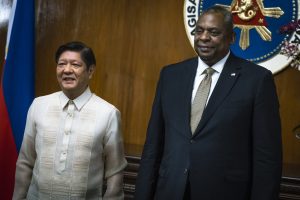The United States plans to spend more than $100 million upgrading the nine Philippine military bases to which it has access under a 2014 security pact, the country’s foreign secretary confirmed yesterday.
In February, the two nations agreed to expand the scope of the Enhanced Defense Cooperation Agreement (EDCA) to four additional military facilities, in addition to the five identified in 2016, all of which have been slated for U.S.-funded upgrades.
“To date, the U.S. allocated a total of over 100 million U.S. dollars to EDCA projects,” Foreign Secretary Enrique Manalo said yesterday during an inquiry of the Senate Committee on Foreign Relations. He said that this included an additional $18 million that the U.S. announced during the two nations’ third 2+2 ministerial dialogue last weekend in Washington. The talks, which brought together U.S. Secretary of State Antony Blinken and Defense Secretary Lloyd Austin and their Philippine counterparts Manalo and defense chief Carlito Galvez Jr., was the first such meeting to take place since 2016.
Signed in 2014, EDCA allows the U.S. military to rotate troops through select Philippine military facilities to use facilities such as runways, and to pre-position military materiel. Manalo told the Senate that the investment from Washington “would cover projects in both existing and new agreed locations.”
The four additional sites announced in February are located in strategically important parts of the country: three of them in Luzon, adjacent to the Taiwan Strait, and on Palawan island, which lies close to disputed parts of the South China Sea.
The top line figures offered by Manalo are not new – $82 million for the five initial bases was announced last year, and the supplemental $18 million after last week’s meeting in Washington – but Manalo offered some hints of the status of the upgrades.
He told the Committee that there had been significant progress in eight of the 16 projects approved for the initial five EDCA locations. Of the eight projects, six are estimated to be completed by the end of the year. These include the $25 million runway rehabilitation project at Basa Air Base in Pampanga, which broke ground last month. It also includes a storage facility at Mactan Air Base in Cebu, and a Humanitarian Disaster Relief warehouse in Fort Magsaysay in Luzon. The upgrades to the four newly designated EDCA sites will presumably begin in short order.
The expansion of EDCA and the injection of U.S. funds into these signs reflect the rapid advances that have taken place in the U.S.-Philippine alliance over the past year, which have reversed, and even exceeded, the reversals that took place under the previous administration of Rodrigo Duterte. Upon coming to office in July 2016, Duterte initiated a turn against its U.S. alliance and steered the inveterately pro-U.S. nation into a closer relationship with the likes of China and Russia.

































